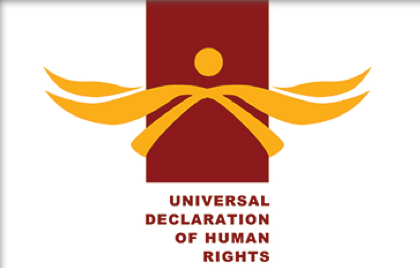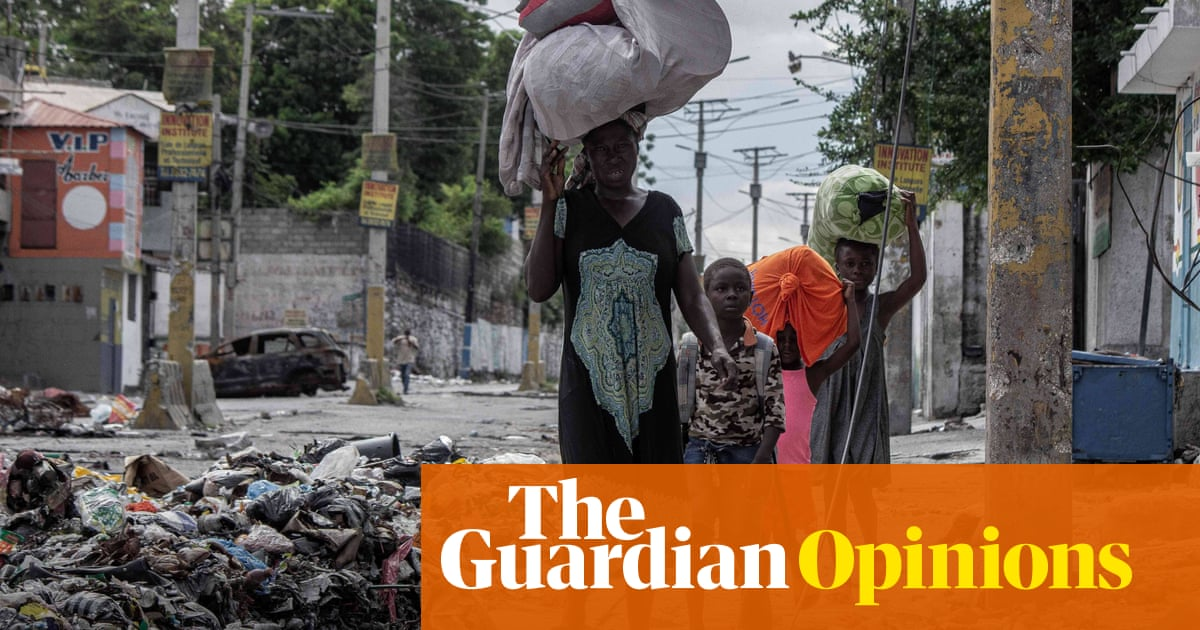- cross-posted to:
- climate@slrpnk.net
- cross-posted to:
- climate@slrpnk.net
A “human rights economy” can deliver for people and the planet because it shifts our focus from growth to humanity – grounding the purpose of the economy in fundamental, universal human values. It offers human rights as a guardrail to keep the economy on track – meeting the challenges of the climate crisis, addressing inequalities and eradicating poverty.
This proposition is not some fairytale. Concrete steps can be taken now, starting with choosing measures of progress other than gross domestic product (GDP) – which tells us nothing about the ecological or social fallout of economic activity.
And we need to start valuing what really counts. GDP has no way of accounting for the estimated 16.4bn hours spent every day worldwide on unpaid work, largely carried out by women, that underpins the global economy: caring for children, people with disabilities and older citizens.
No societal problems will ever be solved through the concentration of wealth.
The problem the article discusses is called “capitalism”, and its consequences are not an “oopsie, we miscalculated!” The system is working as intended—further enriching the elites who control it.
To make serious improvements, we have to remove those elites from their positions of power, and there’s the rub. They would rather go full fascist than compromise their privilege.
The people writing this articles are pretty good at describing symptoms of the deeper problems. Poverty, disposession, environmental damage, overextraction of limited resources.
But they provide you with false or even counterproductive solutions. One of the funnier quotes in this article / one of the linked articles is where they say it’s as if governments have forgotten about the tobacco industry’s history by bringing plastics companies on to commissions, etc. Of course, they are forgetting the actual history of social movements that have tackled exactly these problems: the socialists and quasi-socialist groups around them.
It is easy to tell that they have no plan or understanding of what to actually do because they don’t actually tell you to do anything. They say more protests are needed. Who is going to organize them, what are their demands, and how will they gain and wield leverage? They say companies shouldn’t be on regulatory boards. Sounds great. Why are they there in the first place and what is your plan for fighting them? They say that a GDP-focused economy causes these issues. Well that’s literally capitalism, the dominant global economic system. The only people who have ever directly combatted capitalism are socialists but this is not named. Instead we see “human rights” - based on what? Big business CEO over here and his 50 think tanks say no and that your country will lose $300 million in jobs if you oppose them. What are you going to do about it?
Fundamentally, the angle that we need to organize the economy around human need is true. But doing so is not going to happen by simply appreciating human rights and going to protests or voting. Those are literally all of the things that the ruling class responsible for this mess pay their NGOs and PR people to say to us. This is because they are ineffective or even counterproductive. For example, the concept of human rights is used very selectively, it functions primarily as a propaganda tool. In terms of what actually happens as a result of human rights discourse it tends to be in the interests of incredibly violent imperialistic capital. A NATO general citing human rights concerns so they can do a coups, plunge millions into poverty, and bring open air slave markets back to Africa. “Human Rights” discourse is Western-centric and it is nearly always implied that Western countries have good records and everyone else has bad records, but this is only maintained through selective memories and propaganda. The global system that creates the problems described in this article have their seat in the neocolonial countries, the Western countries with allegedly better human rights records. The countries that will implicitly respond to protest and government lobbying despite this literally never working to achieve this goal.
The problems described in this article are produced by the essential functions of capitalism. Growth is sought to maximize profits, which capitalists are compelled to do by the system itself. It cannot be reformed via any of the suggested approaches. First because it is fundamental to the basic mechanisms of the capitalist system. Second because they are the ruling class and they’re not just going to let you protest into their gone or vote them out.
To combat the system, we must read history, understand politics abs economics, and organize together so that when we do need actions - including but not limited to protests - we are not caught off-guard by the responses because we listened to the advice of academics that have never organized anything and who refuse to read the history of anti-capitalism.
. Instead we see “human rights” - based on what?
-==- Must Read -==-
What I mean in that sentence is: what is the basis for making that goal actually happen? And it’s a rhetorical question, as I critique everything the articles suggest. In reality, they are the strategy of the status quo that got us here in the first place.
In reality, Human Rights are our best tool in the fight against war. Human Rights do not make sense as a concept without understanding that. Equal rights for all means no more fighting for rights. The economic, social, and cultural rights outlined in the UNUDHR are quite obviously not the status quo.
Human rights aren’t a tool at all. In the most generous sense, they are a set of ideals, often disconnected from how they might actually be achieved or identifying how they are violated, consistently. They are also not actually consistently defined. One can of course point to UN-adjacent declarations, but there’s no good reason to say those are complete. They were just one version of some people coming together to say what a baseline of human existence should entail, naturally bringing their own (often racist, chauvinist, etc) biases to the table.
This is easily demonstrated by example. How will you use human rights as a tool to undo capitalism, the driving force of all the problems mentioned in these articles? Be specific and explain how you will defend your life and that of your neighbors when they start bombing the counties declaring their adherence of their economies to human rights. Will human rights build the bunkers? Will human rights substitute the dollar reserve system? Will human rights organize millions of people to resist oppression?
Of course it can do none of those things. It is a limited set of ideals. This discourse is actually hundreds of years old and the idealists that did not ground their approach in the real social position in the economy and real leverage against capital were crushed every single time.
I don’t want you to be crushed. I want you to see these ideals come to fruition through real-world practice.
Equal rights for all means no more fighting for rights. The economic, social, and cultural rights outlined in the UNUDHR are quite obviously not the status quo.
The status quo use the NGO industrial complex to cynically wield human rights rhetoric to undermine and destroy sovereign states, starve children, bomb refugees, destroy pharmaceutical factories, prevent the establishment of food sovereignty, force entire export economies on target countries. They point to that declaration often. This is the status quo I’m referring to and how the concept is currently put into practice. It has been absorbed into the violent status quo as a propaganda tool.
Human rights aren’t a tool at all
This is where you are wrong. They are more than just a set of ideals. They are also a set of binding international treaties.
I am short on time right now, but if this is a perennial issue for you, then I will reply in more detail soon.
The status quo use the NGO industrial complex to cynically wield human rights rhetoric
No disagreement there, other than you should be careful not tot throw out the baby with the bathwater.
This is where you are wrong. They are more than just a set of ideals. They are also a set of binding international treaties.
Not all countries are signatories and, of course, it doesn’t matter if you say it’s binding, what matters is if it’s actually followed. Even the basics of the UN charter are constantly violated, as well as the human rights outlined in later declarations. The countries I talked about earlier that weaponize the concept for violence and their own gain never suffer any consequences from violating these agreements. This is because it’s power and leverage that dictate what actually happens. Power and leverage are tools.
No disagreement there, other than you should be careful not tot throw out the baby with the bathwater.
There’s no baby. The purpose of a thing is what it does. Not what we are told it does. What it actually does. It is a common mistake to believe that the purpose of a thing is to do what it has never done.
The concept of human rights has never done anything remotely like this, nor have the declarations of the UN. They are used, almost exclusively, as a weapon of nation states, usually from oppressor nations to justify their oppression of other nations via legalese. Every major human rights NGO has been part of this process, they help manufacture consent for the targeting of other countries and then sometimes put up an ignored complaint when the violence really starts to hit. Try to define the concept of human rights descriptively rather than prescriptively based on how it’s been used internationally and by its inconsistent application.
If we use the descriptive approach, then applying human rights to the global economy, a claim that is so vague as to be almost meaningless, we arrive back at the conclusion that it’s indistinguishable from how the status quo works. Rich, militarized, violent countries cynically wielding the concept for their own ends and only applying consequences for violating it to their targets. A set of nations more or less immune from the ICC and ICJ. International trade systems controlled by a few imperialist countries extracting from the global south. This is what your “tool” currently does re: the global economy, as international law. Ask yourself: what would actually change and why?
Similarly, considering it to be a tool implies it can be used to accomplish something. Let’s say a person comes up to you and they say they agree with the astoundingly ignorant academics in these articles. They want to create a new economy based on human rights. Then they ask you, “how do I help?”
What do you tell them, how does the approach differ from the status quo, and how will it ever be sufficient to overcome the fundamental economic and military forces aligned against you?
I encourage you to read the letters between Einstein and Freud which lay the theoretical groundwork for human rights.
[1931-1932] [resource] The Einstein-Freud Correspondence
edit: still short on time, but i will re-read your post and reply to the legitimate, non-political questions.
laws are tools. binding treaties create laws.



